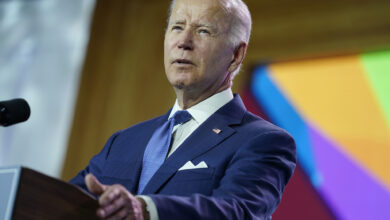Political experts have opined that the request of Field Marshal Hussein Tantawi, the head of the ruling Supreme Council of the Armed Forces, to finalize the constitution before the presidential election and transition of power 30 June would be difficult in procedural terms given that the elections are only two months away, which may lead to prolonging the transitional period.
At a meeting with political party heads on Sunday, Tantawi insisted that the constitution should be written ahead of the elections, slated for the end of May, which was interpreted by many as in the council’s interest to oversee the process. Others saw the move as the council's unwillingness to hand over power to a civilian authority by May, as pledged before.
“It is a maneuver by SCAF,” said Hassan Nafaa, a professor of political science at Cairo University, doubting that the military would hand over power on time.
“We had called for the constitution first, but the military did not listen. Now they want it to happen a few weeks before the election,” he added, considering it an alibi to postpone transition of power.
“The Constituent Assembly will have to finish the job in a few weeks, which is dangerous, for writing Egypt’s Constitution after the revolution must take enough time,” he said, adding that the assembly may ask for the postponement of the election, provided that all political forces agree.
He explained that, according to the Constitutional Declaration, the assembly had six months to draw up the constitution. “Now it has to speed up the task,” he said, noting that no president should come before his powers are defined in a constitution.
Ikram Badr Eddin, professor of political science, agreed with Nafaa. “The elections and the transitional period may well be postponed,” he said.
Not everyone is willing to blame the SCAF for the current constitutional delays. After various disputes, the Constituent Assembly, which was formed last month, was deemed illegal, as it had a high representation from within parliament, whereas MPs were only responsible for electing its members, as per the Constitutional Declaration. The formation led to disputes about the Islamists seizing the assembly through their parliamentary majority.
“The SCAF is not responsible for the delay,” said Norhan al-Sheikh, professor of political science at Cairo University. “It is Parliament that is attempting to dominate the assembly.”
Presidential candidates also voiced concerns about a potential delay in the elections. “The election should be held as scheduled,” said presidential candidate Amr Moussa, warning of adverse economic repercussions in case it is postponed. “It is difficult to finish the constitution in a few weeks amid such polarization.”
On his Twitter account, Moussa warned of the transitional period continuing as is, and suggested ambiguous options such as a presidential council.
“We must separate the election from the constitution, for we have wasted a long time, and the assembly must immediately be formed within the criteria that would be agreed upon on Sunday,” he wrote. “I suggest the assembly start with determining the nature of the political system and defining the president’s powers.”
Similarly, presidential candidate Mohamed Selim al-Awa called on the Egyptian people and political forces to insist on handing over power to an elected president before 30 June.
In a statement on Monday, Awa accused the military council of intending to extend the transitional period beyond 30 June, given Tantawi’s statement that the council would not hand over power unless a new constitution that defines the powers of the president is completed.
“We already have a Constitutional Declaration that determines the powers of the president, and the people approved it in the 2011 referendum,” he said. “The new president will act in accordance with these powers until the new constitution is issued.”
“The military council has no right to determine the powers of the president, oppose any such powers or refrain from handing over power to an elected president on the pretext that his powers have not been defined, because all this contradicts the will of the people who will elect their own president,” he said.
“Also, no one may interfere in the work of the Constituent Assembly that would be elected by Parliament or urge it to speed up its task,” he said.
Translated from Al-Masry Al-Youm




